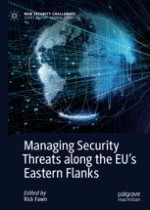2020 | OriginalPaper | Chapter
5. The EU and Pan-European IOs and ‘Symbolic’ Successes and Failures in the Protracted Conflicts in Moldova and Georgia
Author : Nina Lutterjohann
Published in: Managing Security Threats along the EU’s Eastern Flanks
Publisher: Springer International Publishing
Activate our intelligent search to find suitable subject content or patents.
Select sections of text to find matching patents with Artificial Intelligence. powered by
Select sections of text to find additional relevant content using AI-assisted search. powered by
